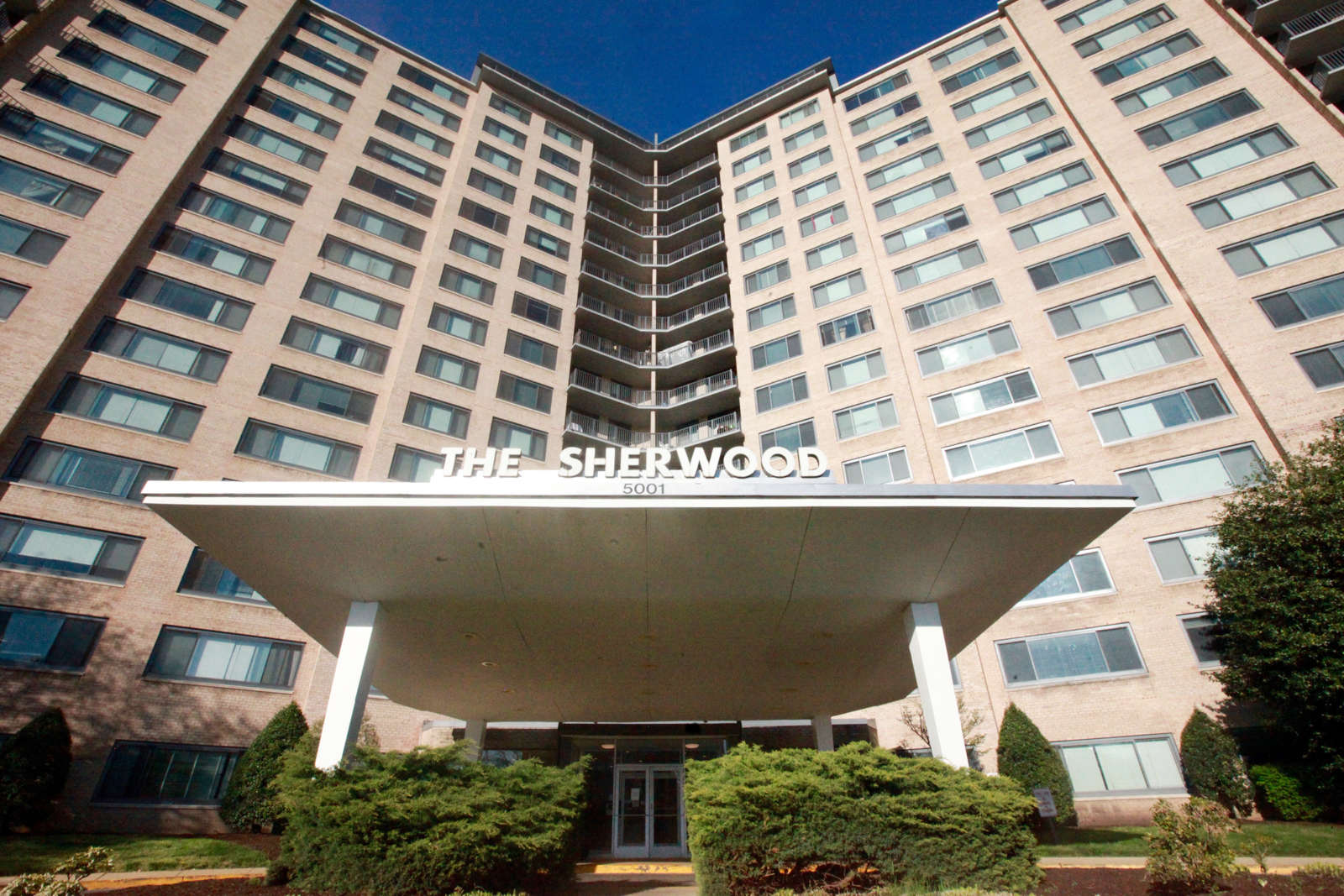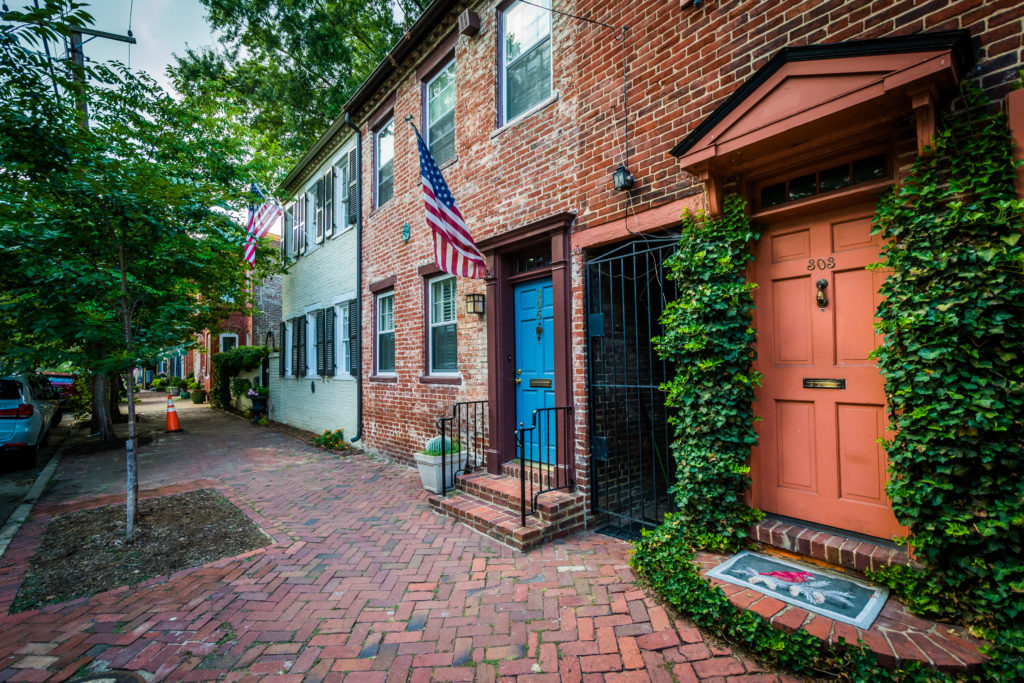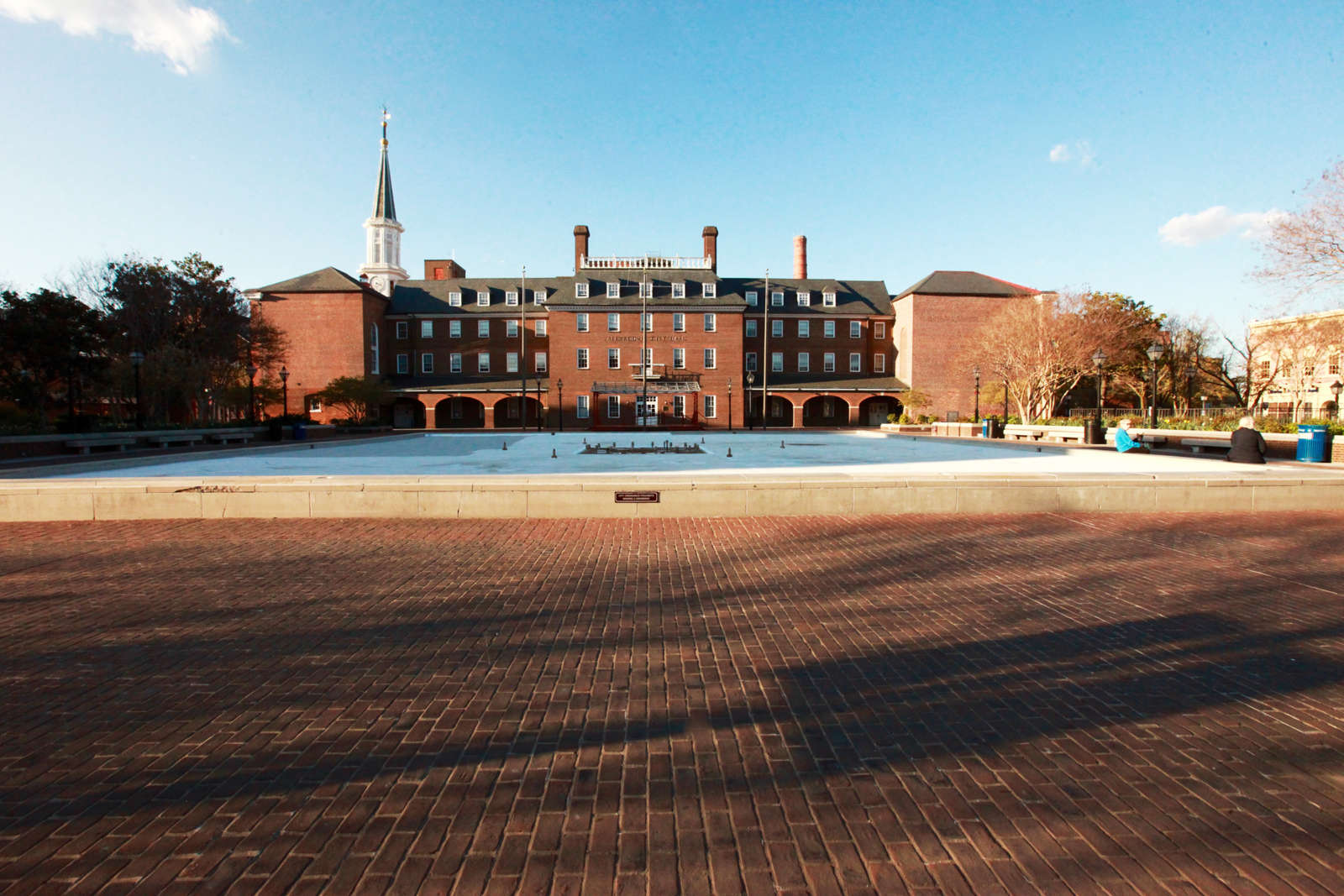(Updated at 4 p.m. on Oct. 18) For at least five weeks, Loren DePina and her family will be forced live in a one-bedroom apartment until flooding damage in her three-bedroom Southern Towers apartment is fixed.
DePina’s and 13 other apartments at Southern Towers’ Sherwood building (5001 Seminary Road) were significantly damaged early Sunday morning by a water leak that worked its way from the eighth floor of the 15-story building all the way to the first floor. Video of the damage showed residents wading through inches of water in apartments and hallways and flooded elevators.
“I’m not paying rent for November,” DePina said. “That’s not happening. Five weeks is putting us right before Thanksgiving.”
On Monday, DePina got keys to a one-bedroom apartment where her family of four will have to live for an estimated five weeks. She said that building management were not responsive for a full day after flooding started.
CIM Group emailed residents Monday morning at 8 a.m. that the flooding was caused by air conditioning pipes that date back to when the building was constructed in the 1960s, and that residents will be relocated.
“To address this issue, we allocate substantial financial resources, amounting to tens of thousands of dollars on a weekly basis, toward the ongoing repair and maintenance of these risers,” CIM Group recently wrote in a letter to City Council. “This often involves the necessity to access and open walls within resident units for repair purposes and can take as long as four weeks.”
CIM Group bought Southern Towers in 2020, and residents have protested living conditions and evictions for years, especially throughout the pandemic. This year alone, Southern Towers was also visited by the director of the Federal Housing Finance Agency and CIM Group was asked to resolve its eviction fight by Virginia Senators Tim Kaine and Mark Warner.
African Communities Together sent an email to CIM Group asking for the following:
- Immediately relocate tenants to habitable units on the property. At a minimum, tenants must be moved into units that are comparable. If tenants are moved into bigger or renovated units (when they previously were in smaller or unrenovated units), tenants should not be charged higher rent or higher utility bills.
- Residents who had to move into a hotel, Air BnB, or other lodging to escape the flooding should be fully reimbursed by CIM.
- Rent for the month of November should be waived for all affected tenants to accommodate the financial impact of the flooding.
- Water and electricity bills should be totally comped in next month’s utility bill for all tenants to accommodate the instability in charges brought on by the flooding.
- Management must be transparent with the tenants at all stages of this process. Tenants must be given consistent and clear notice about: what caused the problem; what CIM is doing to fix it; how long repairs will take; and any other relevant updates. “Consistent and clear” notice shall also include translated messages for tenants in need.
Last month, Vice Mayor Amy Jackson and Council Members Alyia Gaskins, Canek Aguirre, Sarah Bagley, Kirk McPike and John Taylor Chapman toured the property. Gaskins wrote CIM Group that she toured the buildings with her two young children, and that one of them had a coughing fit due to mold.
“What we observed is unacceptable,” Gaskins wrote. “We also observed holes in walls and a major flood in the elevator. As a councilmember and mother, I do not want anyone living in conditions that compromise their health, safety and stability.”
Bethany Chang is a principal at CIM Group, and said in a statement that the incident was “incredibly inconvenient.”
“As any homeowner or renter knows, sometimes maintenance issues happen like pipes bursting, and it is always incredibly inconvenient and unpleasant when it happens,” Chang said. “Our team at Southern Towers is working diligently to ensure that all impacted residents are provided with timely repairs and, if needed, temporary housing. When this leak occurred, our team was in touch with the residents that day and began mitigation and repairs immediately. They have not ceased working since, and they will continue to work until the job is complete.”
Gaskins said residents have contacted her about subpar resolution to maintenance requests, inconsistent heating and cooling systems and high utility rates.
CIM Group wrote a lengthy response to Gaskins and said that they bought a derelict property and are the victim of disinformation from advocacy groups.
The full response from CIM Group to Gaskins is below.
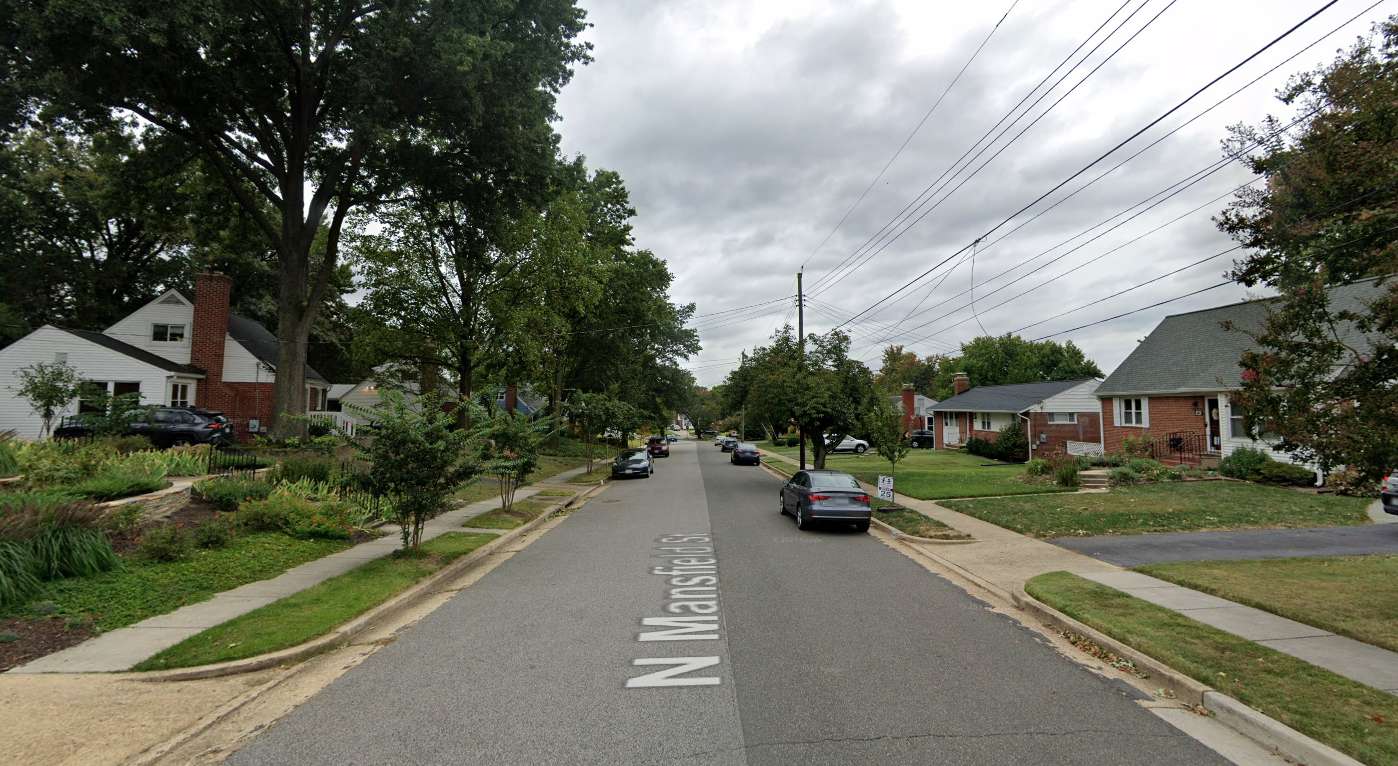
Alexandria staff returned to the Planning Commission one month after Zoning for Housing/Housing for All’s debut, but city leaders remained tepid in their support for the project.
Of note during the work session, however, was a concise breakdown of how Zoning for Housing/Housing for All might affect the city’s housing stock.
The report, delivered by Director of Planning Karl Moritz, said the City of Alexandria currently has around 80,000 units of housing. Moritz said the changes brought about by the zoning changes would create an estimated 2,838 units.
“I regret the precision of a number like that implies,” Moritz said, “because of course these are estimates and based on a number of assumptions.”
Moritz said there are around 50,000 new housing units allowed across the city under approved small area plans, with an anticipated 11,000 that would have been built prior to the approval of Zoning for Housing/Housing for All.
“So that 2,800 is in addition to the 11,000,” Moritz said, “a 25% increase.”
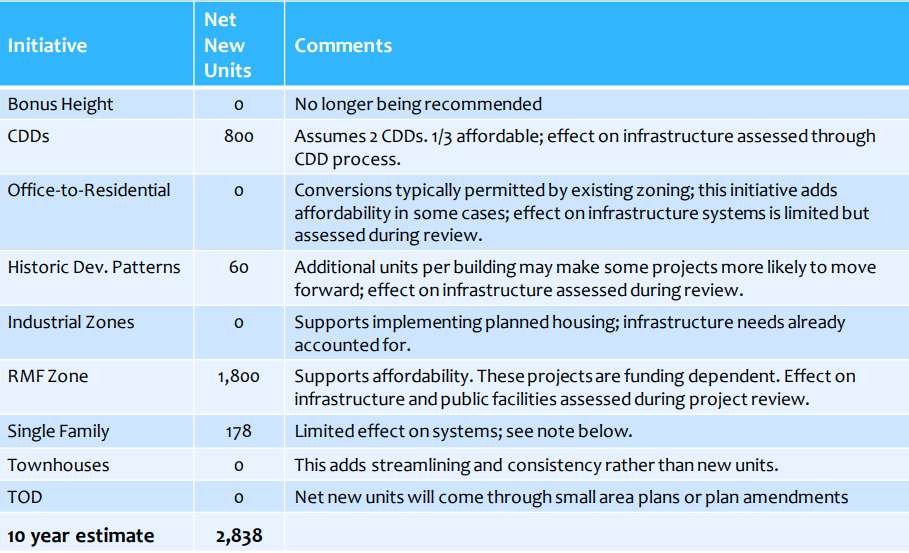
Experts previously told Alexandrians in a panel discussion that the city’s increase in housing supply hasn’t been keeping pace with the demand, leading housing prices to continue to increase.
Planning Commissioners said they’re still “underwhelmed” by the number of units created in the proposal, particularly with only 178 units of additional housing added with the elimination of single-family-only zoning.
“I’m still underwhelmed by the number of units generated in this first phase and I wonder if there’s a way we can add to that as this moves forward,” Commissioner Mindy Lyle said.
Planning Commission Vice Chair Melissa McMahon said, in the future, the city should consider more radical steps like eliminating floor-area ratios (FAR) or parking considerations when it comes to building approval.
“As we talk about more ways to make it cheaper, easier and faster to do housing development, it seems to me that taking us out of the process of deciding how much parking is necessary is a really good idea, if only because it makes it less annoying for everyone developing it,” McMahon said. “That doesn’t mean a single family home won’t have a parking space off-street, it doesn’t mean a townhouse will be built with zero parking instead of a one-car garage, it means there will be options and people developing that unit at that location can decide what’s best for them.”
Moritz said city staff set limits for themselves before Zoning for Housing/Housing for All started, but that those limitations had an unexpectedly large impact on the recommendations.
“Staff did create some parameters around our work: that we would not change FAR, heights or setbacks as part of going into this with the anticipation that creating that boundary would also give us room to make important policy changes without changing what people would see on the ground,” Moritz said. “We learned that things like setbacks and FAR, in particular, is an extraordinary limit and it’s a big factor on why that overall number is low, but changing FAR is a more complicated analysis.”
Planning Commission Chair Nathan Macek said his hope is that moving forward, Zoning for Housing/Housing for All is a first step in the discussion about zoning changes, rather than the end.
“We’re all a little underwhelmed by the numbers we’re seeing… but I do think it’s healthy to look at this not only as one and two phases, but a continual process going forward we revisit continually, not a one-and-done thing in a great to-do now,” Macek said. “It has to be part of our regular routine and something we think about that way.”
Image via Google Maps
(Updated 9/19) The next public discussion for Alexandria’s Zoning for Housing/Housing for All is coming next week.
The second of three fall community meetings is scheduled for Thursday, Sept. 28, from 6-8 p.m.
The proposal debuted at a joint City Council-Planning Commission meeting earlier this month. While the plan includes some significant changes, like the removal of single-family-only zoning, there were widespread concerns on the governing bodies that the practical impacts of these changes would be negligible without other significant alterations to zoning requirements like setbacks or density.
“Staff will summarize draft recommendations presented during the September 5 joint City Council-Planning Commission work session, review the schedule of additional engagement opportunities, and answer questions from the community,” the release from the City of Alexandria said.
The last meeting was on Thursday, Sept. 14, and was fairly uneventful. As with the upcoming meeting, there was no real public comment section, with a few public comments read aloud off note cards by city staff.
The meeting will be held in-person at the William Ramsay Recreation Center (5650 Sanger Avenue) or can be viewed online. In-person and virtual interpretation services will be provided in Amharic, Arabic and Spanish.
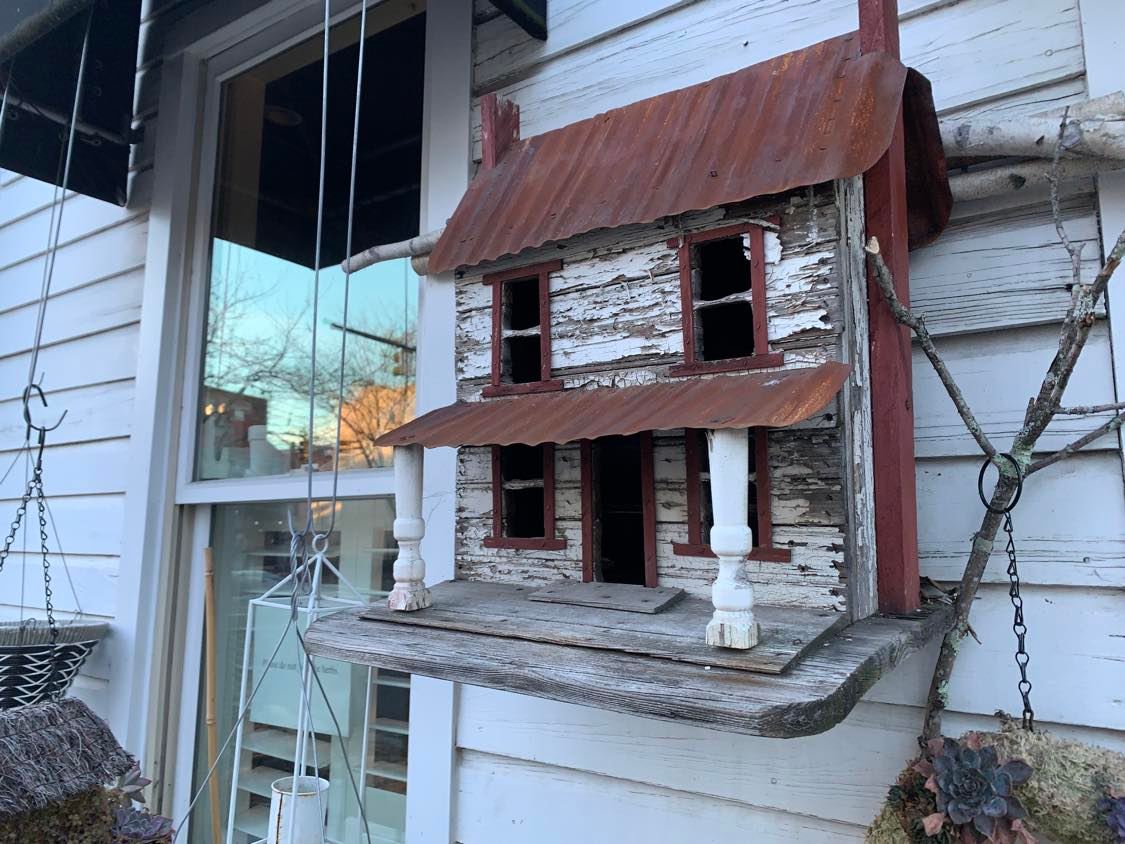
A little over a week after the City of Alexandria debuted its new Zoning for Housing/Housing for All plans, the city is inviting the public to the first community feedback session.
City staff presented the draft recommendations earlier this week at a City Council-Planning Commission work session. The big headline recommendation was ending single-family-only zoning, though beyond that city leaders were skeptical about the plan’s ability to make a substantial impact on affordable housing supply.
The meeting next Thursday is the first in a series of community meetings. The City is embarking on a whirlwind tour this fall of public meetings and town halls regarding the plan before a final vote on Nov. 28.
“On Thursday, September 14, from 6-8 p.m., the City will hold the first of three fall community meetings on the Zoning for Housing/Housing for All initiative,” the event listing said. “Staff will summarize draft recommendations presented during the September 5 joint City Council-Planning Commission work session, review the schedule of additional engagement opportunities, and answer questions from the community.”
In a poll earlier this week, roughly 53% of respondents said they thought the zoning changes go too far, while 32% said didn’t think the changes went far enough. Only 14% said they thought the city struck the right balance.
The meeting can be attended in person at the Charles Beatley Central Library (5005 Duke Street) or online.
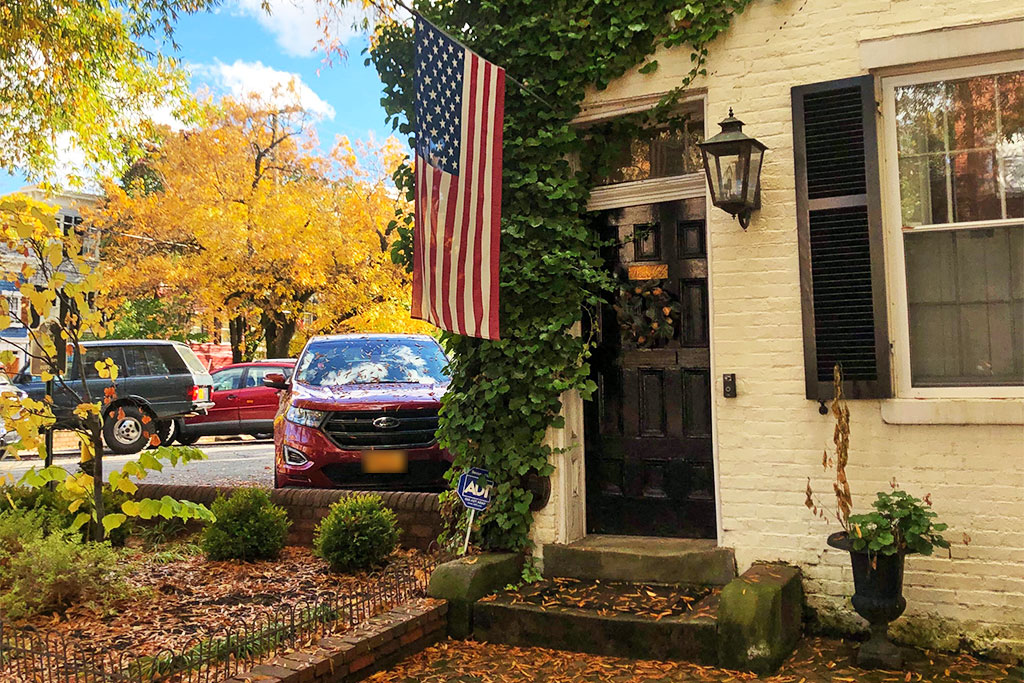
The Zoning for Housing/Housing for All proposals were finally unveiled last night and opinions have been decidedly mixed.
The plan focuses on incremental changes in zoning policy that weren’t quite as ambitious as some hoped and others feared.
The zoning changes could create more housing in industrial zones, reduce parking requirements for housing, and allow multiple residences to be built in single-family zoning.
While a similar change sparked widespread community discussion in Arlington, in Alexandria, city staff noted that the plan does not include recommendations to change lot frontage, square footage, or other restrictions to construction — making the change likely to have a less dramatic impact than might initially be supposed.
City leaders offered tepid support for the proposals and praise for the effort that went into the project. At the same time, Planning Commission Vice Chair Melissa McMahon and others expressed concern that the changes didn’t go far enough.
“I’m a tiny bit underwhelmed,” said McMahon. “That’s not a criticism, it’s more a sense of existential disappointment that the challenges we face are so large… we’re still barely moving the needle. I want to put that on the table because that’s my heartfelt reaction.”
McMahon wasn’t alone. Advocacy group YIMBYs of Northern Virginia released a statement sharing concerns that the incremental changes would be insufficient to address the city’s housing shortage.
“While our grassroots organization’s members welcome the recommendations discussed tonight, they also share the concern expressed by multiple City Council members and Planning Commissioners that these incremental proposed changes would be insufficient to address the scale of our city’s housing shortage and affordability crisis,” the organization said in a release. “We look forward to advocating for their expansion.”
At the same time, the group said they supported the reforms as a critical first step.
“Alexandria is a wonderful city, but it has become prohibitively expensive as demand for living here outpaces the supply of homes available,” said Peter Sutherland, an Alexandria Lead for
YIMBYs of Northern Virginia. “These reforms are a critical first step toward ensuring Alexandria’s future as an affordable, sustainable, and welcoming community.”
But while some advocated for the city to go further, others had previously shared concerns that the planned zoning changes could go too far. Last Tuesday, a rally led by a group called The Coalition for a Livable Alexandria gathered a crowd of supporters outside City Hall to argue against potential increases in density.
“Residents who have a different viewpoint, residents who have concerns, residents who ask tough questions are not the enemy,” said Coalition Chair Roy Byrd at the rally. “We just want to make sure we do it in the best way possible and that we work together.”
The Coalition for a Livable Alexandria could not be reached for comment.
Some at the meeting last night said the proposals struck the right balance between the status quo for zoning and significant changes.
“I have a naturally conservative attitude to fixing what isn’t broken,” said Planning Commissioner David Brown said. “This is not a radical proposal, and they would tell you maybe it’s not radical enough. My sense is this is an incremental proposal… The work is not done. There’s going to be more to do. Your approach here has been oriented toward the nuts and bolts and I think it will be fairly easy to put together the statutory language to implement this.”
Residents of an Arlandria affordable apartment complex say the new owner is drastically, and illegally, raising rent and not notifying tenants within 60 days.
Potomac West Apartments LLC bought the four-building, 60-unit apartment complex in June. Last month, residents with expiring leases were notified via letter of a rent increase.
“We just wanted to say thank you for being a wonderful resident of Potomac West Apartments,” begins an Aug. 1 letter to a resident. “We are planning on upgrading the property to include new washing and drying machines, renovated laundry rooms, landscaping upgrades and much more.”
The property manager then reminded residents in the letter that they must provide a 60-day notice if they are going to vacate.
Residents protested the action on Tuesday afternoon with a rally organized by Tenants and Workers United (TWU). The property is directly across the street from Housing Alexandria’s massive affordable apartment complex development at the corner of Mount Vernon Avenue and Glebe Road.
Jose Coca saw his rent increase by more than $500. The 85-year-old custodian at the Pentagon has lived on the property for more than 30 years and said that no improvements have been made to the property.
“When we go to the leasing office about a maintenance issue, they don’t pay attention to us,” Coca said.
Medical assistant Soraida Cruz has lived in her two-bedroom apartment for 18 years. She said her rent is being increased from $1,498 to $1,725 per month, and that Potomac West Apartments and property manager Chapman Management are not responsive.
“It hurts,” Cruz said. “It really does. I’m the only one working. If we had better conditions, paying less than what they are raising right now, I would continue living here, but it’s tough.”
Cruz also said that the buildings have rodent and maintenance issues that residents pay out of pocket to fix.
Larisa Zehr, an attorney from Legal Aid Justice Center, said that the new apartment building owners are breaking the law by not giving tenants at least 60 days notice of a rent increase.
“This makes common sense and it’s a basic protection for tenants,” Zehr said. “That did not happen here. As this area sees increased economic interest, we’re seeing this pattern developers are hiking rents and driving out long term stable families. This is purely profit-driven. We see rents increase without any improvement to living conditions.”
Zehr continued, “Potomac West Apartments is intended to be long-term affordable housing, which is subsidized by the Low Income Housing Tax Credit Program. That means the owner has to cap rent at 60% of area median income. In Northern Virginia, as low income people are pushed out and displaced by wealthier households, that number keeps going up. The cap is not low enough to protect working class families like the families in this neighborhood.”
TWU mailed two letters to the property manager and owners asking for a sit-down to discuss rent increases and tenant needs. They did not receive a response.
“I know it’s not easy to be here after you work two jobs, after you cook for your family,” TWU Executive Director Evelyn Urritria told the protestors. “You are here because you care about your housing situation. It’s unfair what’s happening, it’s unjust what’s happening.”
Potomac West Apartments LLC and Chapman Management did not return calls for comment.
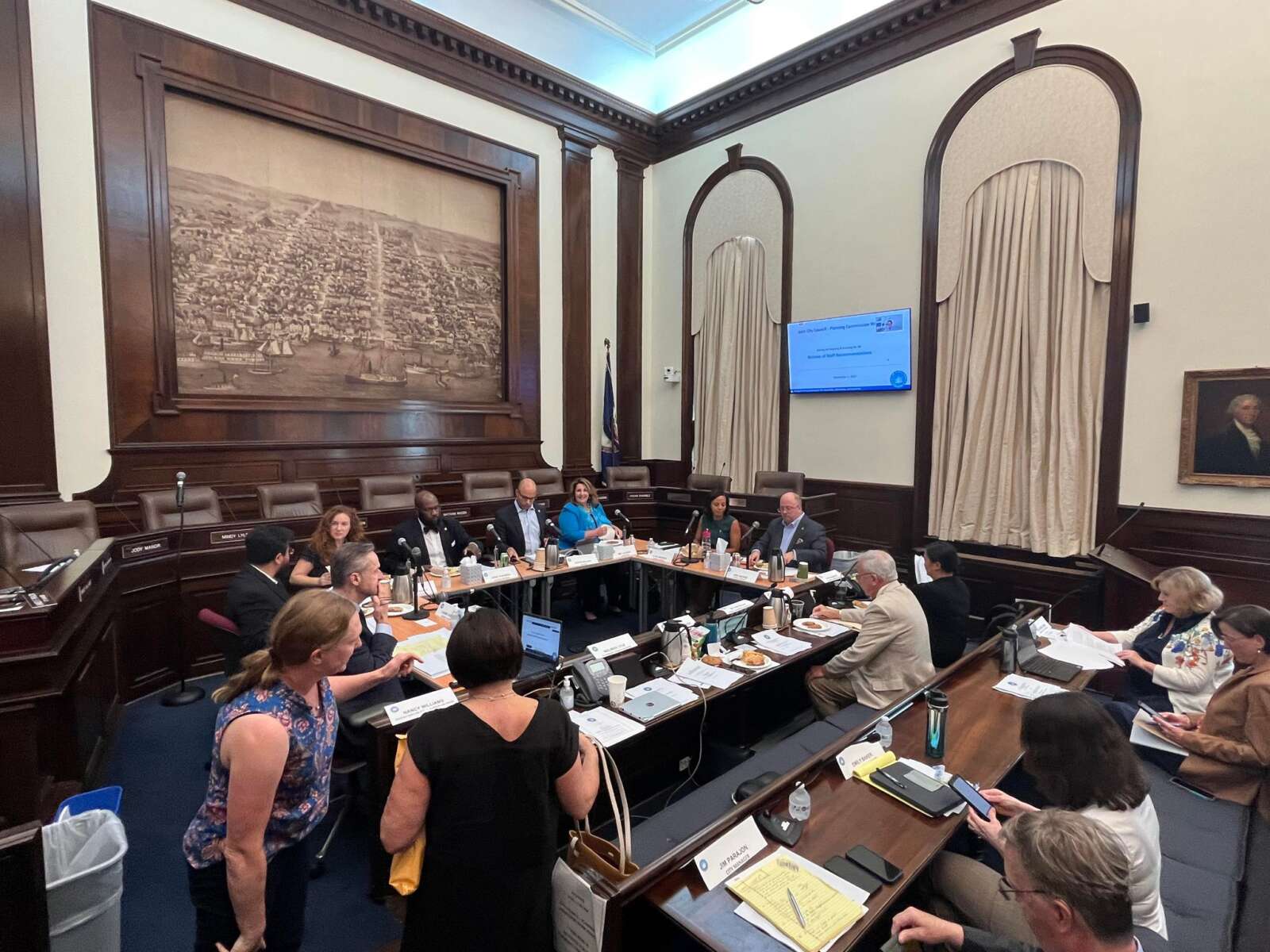
The Zoning for Housing/Housing for All project turned out to be less of a revolution in Alexandria’s zoning and — for better or worse — more of a gradual evolution.
After extensive build-up and public discussion, Director of Planning Karl Moritz debuted zoning changes to a mixed response from city leaders.
The core gist of Zoning for Housing/Housing for All is a ground-up effort to rework city zoning to be more affordable, accessible and available. While there was praise around the work that went into the project, several city leaders said they were underwhelmed by the project’s scope.
Zoning for Housing/Housing for All touches on some of the same topics as neighboring Arlington’s similar Missing Middle zoning changes, including expanding housing options in single-family zones, but it became clear during the City Council and Planning Commission discussion that existing zoning limitations might blunt the impact of that change.
The staff recommendation is to add the opportunity to construct two to four-unit dwellings in single-family residential zones. The estimated result would be 66 new residential buildings developed over 10 years and 178 total new units.
An optional alternative is a more conservative two-unit dwelling in some zones and three or four multi-unit dwellings in others.
However, what seems like a significant change is watered down by the fact that the additional units would need to exist within the current limits for lot coverage and height as current single-family dwelling units.
According to the presentation:
To preserve neighborhood compatibility, the proposed new residential dwelling types would have to follow the same limitations for lot coverage and height as any new single family dwelling would. Setbacks, lot frontage, floor area ratio and height requirements would be equally applied to any new residential dwellings constructed in a zone.
City staff also recommended moving to no minimum parking requirements for dwellings with up to four units in the enhanced transit areas along Duke Street, Old Town/Del Ray and the West End.
Housing outside of those areas would have a minimum 0.5 parking spaces per unit for dwellings — with a note from Moritz later that the city rounds those half-space requirements up if there’s an odd number of units proposed.
Other changes included replacing the “family” requirement in zoning ordinance with a simple occupancy limit.
Moritz said changes to lot coverage requirements could be addressed later, but that city staff didn’t want to change too many elements of zoning at once.
“We thought it was important to hang on to the overall amount of building that is permitted when taking this particular step,” Moritz said. “In terms of single-family zoning… the size of the container limits what you can have there.”
Moritz said not touching things like setback requirements was a conscious decision by staff.
“There’s no way to fit more units in there in a way we thought the market would adopt,” Moritz said. “We have chosen to limit ourselves to the development envelope that currently exists.”
Multiple City Council and Planning Commission members said that caution was disappointing.
“I’m a tiny bit underwhelmed,” said Planning Commission Vice Chair Melissa McMahon. “That’s not a criticism, it’s more a sense of existential disappointment that the challenges we face are so large… we’re still barely moving the needle. I want to put that on the table because that’s my heartfelt reaction.”
Elsewhere, the report also put a nail in the coffin of plans to add more density and height to more areas of the city. One of the city’s main tools for getting affordable housing units from developers is trading those units for additional height and density allowances.
The city had considered expanding that trade to areas with lower height limits — between 45-50 feet — but ultimately found that other limits like square footage and setback requirements would likely keep that from being utilized.
Unexpectedly, some of the most substantial changes were proposed for Alexandria’s fairly limited number of industrial zones. Moritz pointed to Eisenhower West as an example of an area of industrially zoned buildings with retail, exercise, performance spaces and church uses compatible with housing.
Zoning for Housing/Housing for All aims to turn these industrial zones into areas with better housing and transit options.
“Most of these industrial buildings are built in an anti-urban way,” Moritz explained. “Our proposal is to regulate new industrial buildings in our industrial zones with some urban design criteria.”
Mayor Justin Wilson said the earlier chicken kerfuffle revealed to many on City Council that industrial zoning was fairly laissez-faire about nearly everything except having residential units.
“You can do literally almost anything in industrial zones except sleep there,” Wilson said. “While single-family zoning gets all the attention in this discussion, I imagine other parts of the proposal will be far more productive.”
But these changes for industrial areas only seemed to rub salt in the wound for those disappointed with the conservative changes to single-family zoning.
“By the time we get to single-family zoning, staff are saying the only thing we’re changing are the number of units; we’re not changing any of the things that create those constraints,” McMahon said. “That didn’t resonate very well for me; that in one part of town, we’re talking about freeing up things, making buildings more dense, in another part of town, we’re retaining it all except for the number of units.”
Commissioner David Brown said he understood McMahon’s concerns but said he appreciated the proposal as an incremental change.
“I have a naturally conservative attitude to fixing what isn’t broken,” Brown said. “This is not a radical proposal, and they would tell you maybe it’s not radical enough. My sense is this is an incremental proposal… The work is not done. There’s going to be more to do. Your approach here has been oriented toward the nuts and bolts and I think it will be fairly easy to put together the statutory language to implement this.”
The proposal will go through an extensive public review process over the next few months before ultimately heading back to the City Council for a vote on Nov. 28.
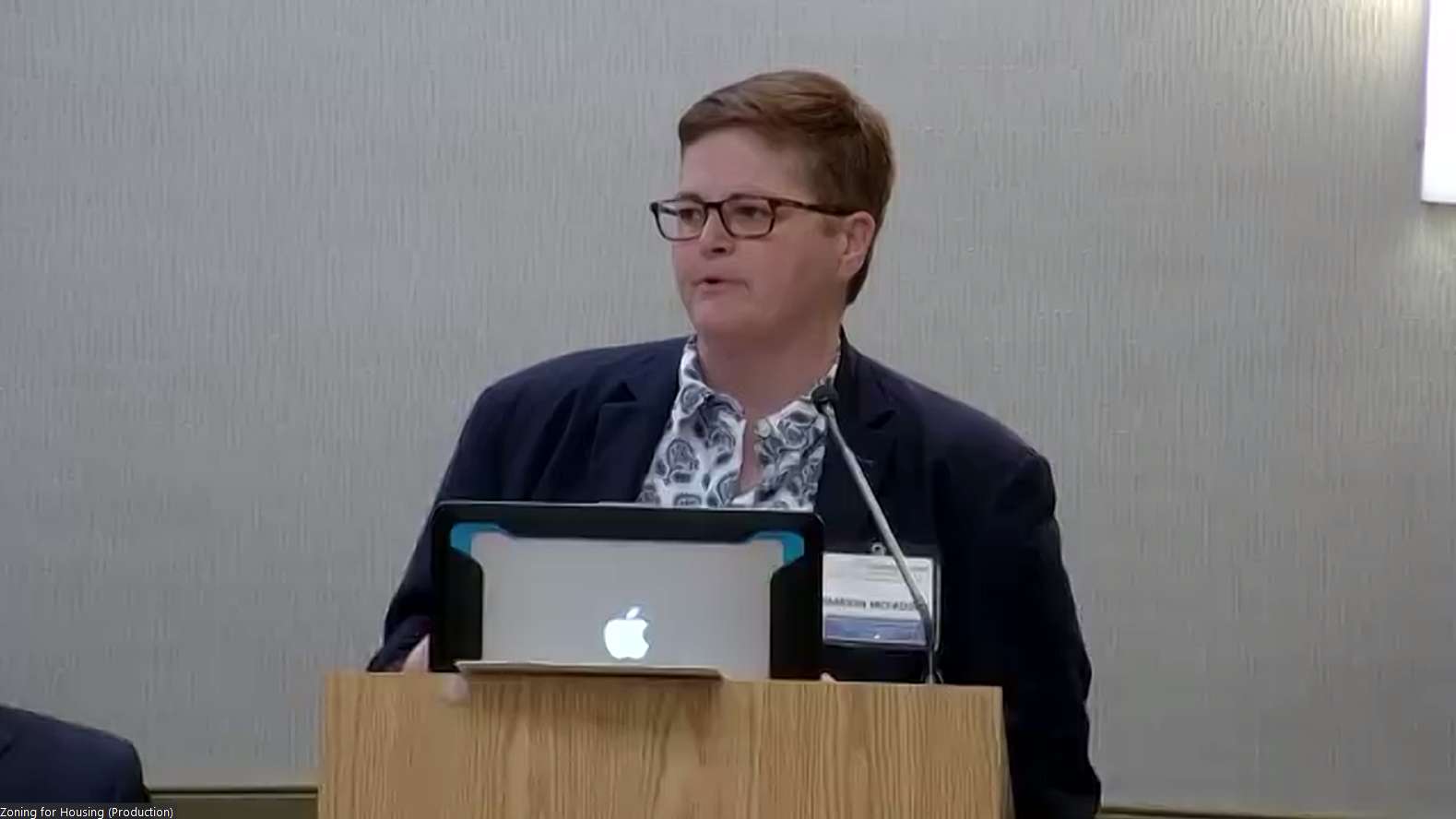
The bottom line at a panel on housing last night: housing is unaffordable in Alexandria and likely won’t get cheaper without more construction.
Last night, the City of Alexandria hosted a panel of experts to discuss the state of housing in the city — from a look back at the evolution of the city’s zoning code to projections and trends in the housing market. The panel is part of the city’s ongoing Zoning for Housing/Housing for All project, which aims to reshape zoning in the city to be more accessible, affordable and available.
Even before the release of official recommendations about the Zoning for Housing/Housing for All plan, it’s already drawn some backlash from local residents. At a rally on Monday night outside of City Hall, residents expressed support for goals of adding more affordable housing, but shared concerns about how density could impact the city’s neighborhoods.
While the plan’s recommendations aren’t public yet, it comes in the wake of the “Missing Middle” zoning changes that stirred up similar contention in Arlington.
The panel on Tuesday night notably didn’t include specifics about the recommendations — that’s scheduled for a work session on Tuesday, Sept. 5 — though some previews of what’s to come did slip in.
Much of the panel focused on examining the present housing market, what role racial discrimination played in the structuring of the city’s neighborhoods, and federal funding opportunities for future housing projects.
Present
Anita Morrison, principal at Partnerships for Economic Solutions, said Alexandria’s housing supply has trended upward.
“In the last five years, the city’s seen 5,898 new units,” Morrison said. “The pipeline includes another 2,000 units under construction and 18,000 in the pipeline, some of which we can expect will not come into fruition.”
Morrison said that project pipeline includes huge redevelopment like that at Landmark Mall and the Potomac GenOn power plant.
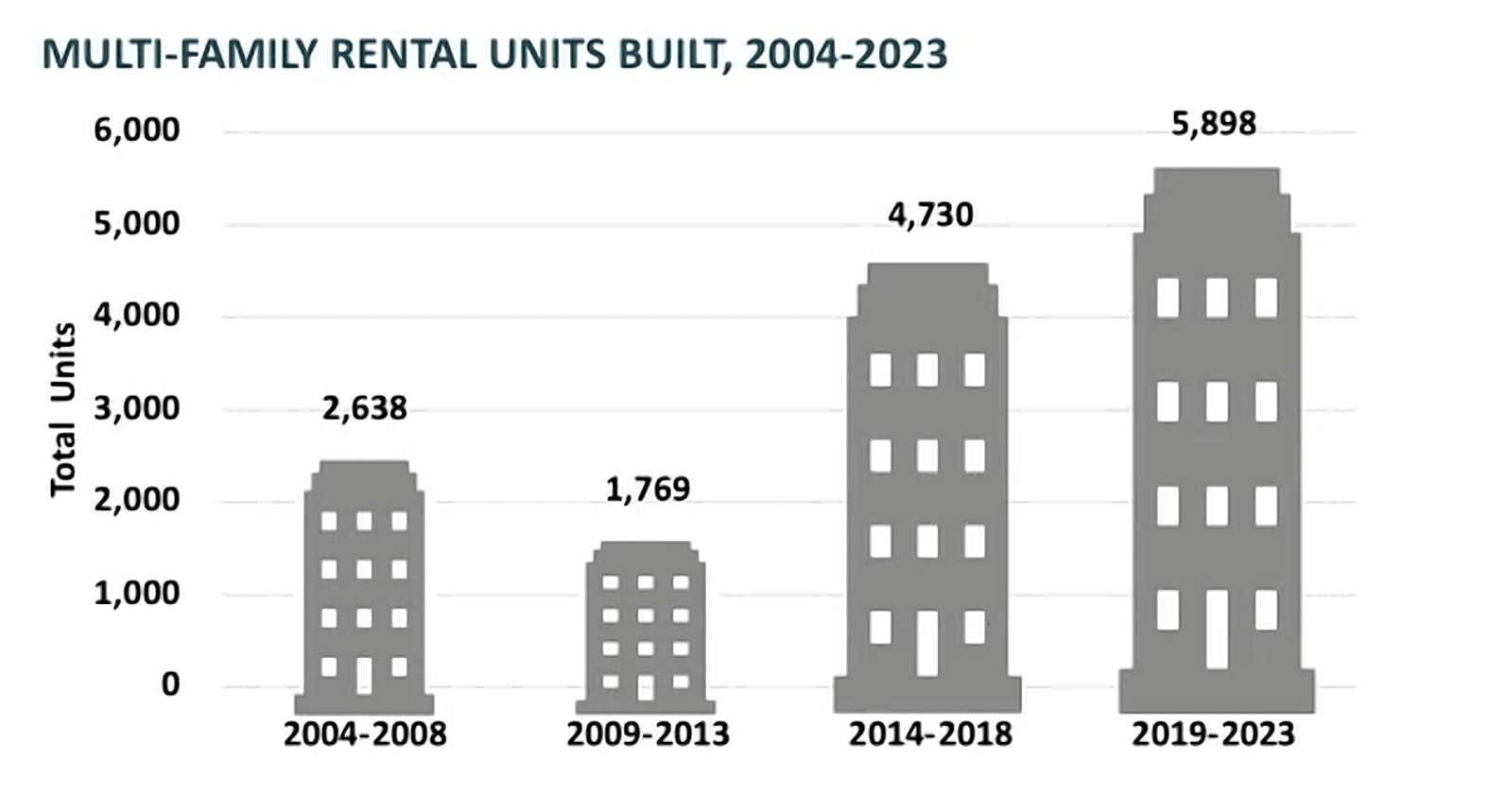
Morrison also credited some of that swelling in local units to office conversions to residential buildings, a market in which Alexandria is leading.
“One of the ways to bring that many units to the market has been a change in the nature of the office market, reducing the demand for office space,” Morrison said. “For some older buildings, this has meant their occupancy fell a lot and created a need to do something different.”
Morrison said 1,700 units have been added to the city through office conversions.
Despite the increase in units, Morrison noted that rents have also continued to trend upward.
“In 2020, average rents declined to 2018 levels,” Morrison said, ” but then rebounded in 2021.”
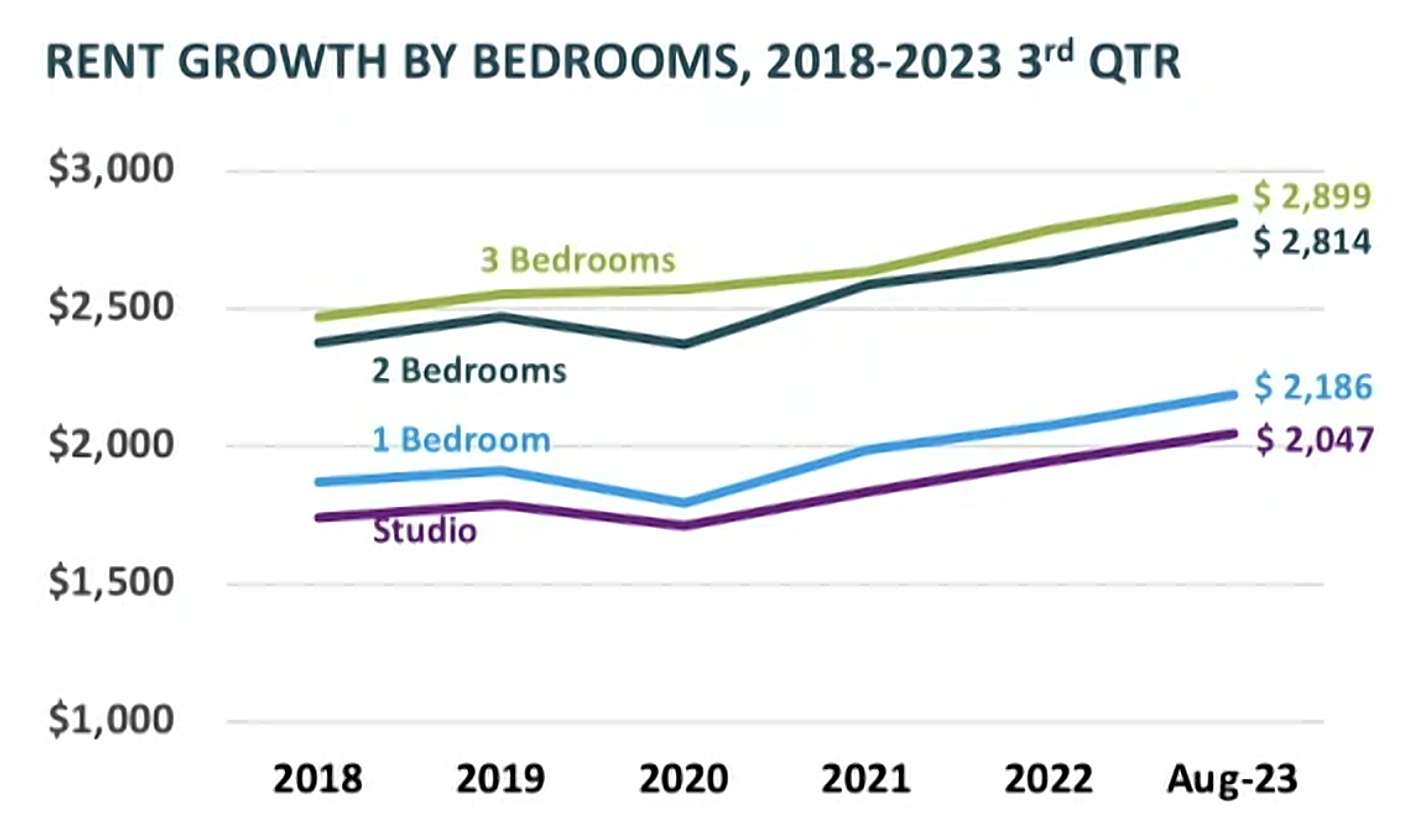
Morrison said the high rents are squeezing out young professionals.
“The fastest growing age category is people ages 65-74 and children under 20, but folks 20-24 dropped in Alexandria and 25-34 did not grow as much as the rest of the market,” Morrison said. “We think that’s a reflection of not being able to buy here.”
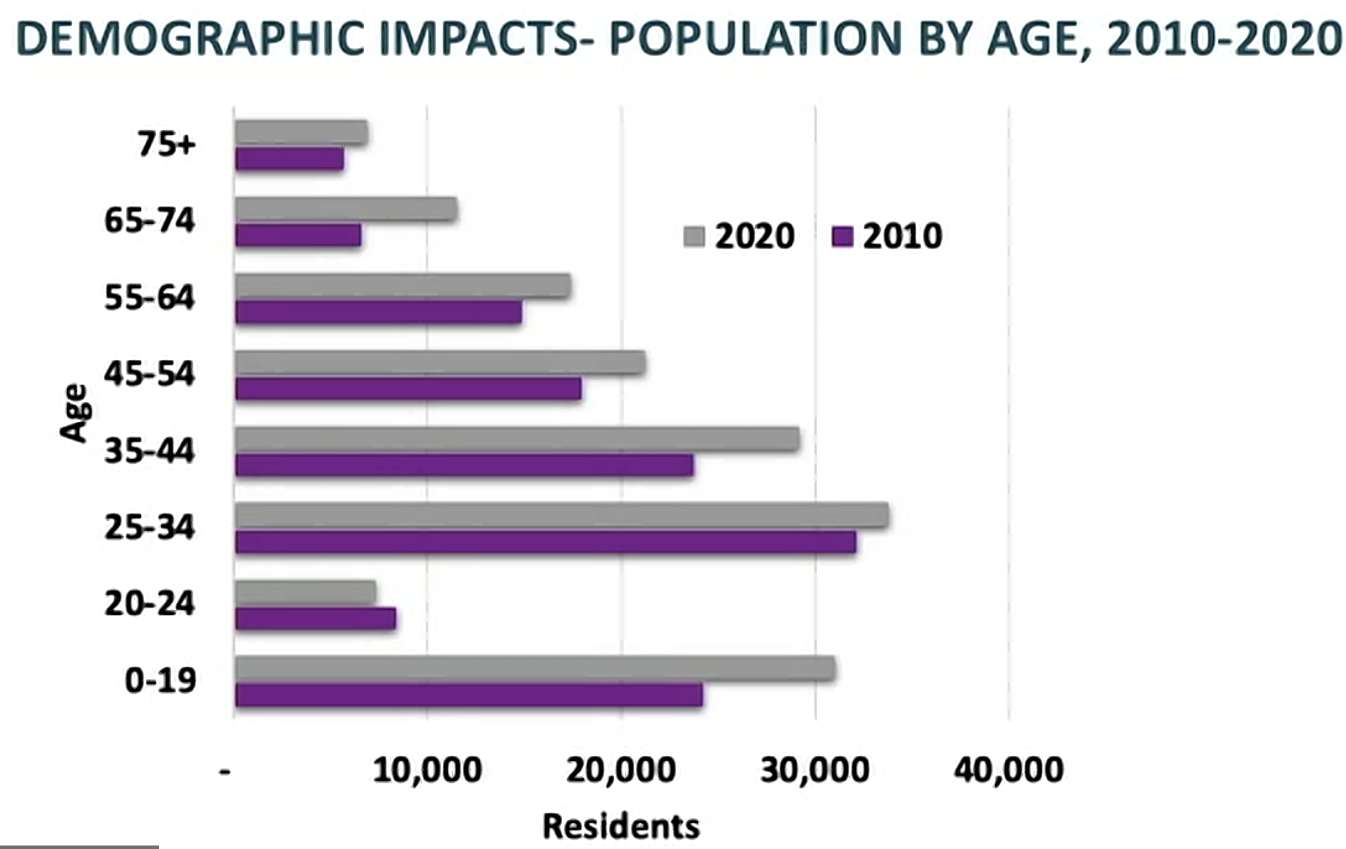
An attendee asked if the increase in units not leading to a lower rents punches a hole in the argument that more supply will drive down rents. Morrison replied that the market is more complicated than that.
“The scale of developments haven’t met the need,” Morrison said. “We’re always running a few steps behind the demand. It’s about getting enough supply to increase vacancy rates and create competition, but we’ve never moved the needle enough with supply to see that happen.” Read More
Dozens of protestors rallied against Alexandria’s zoning for housing plan in front of City Hall on Monday.
The rally was spearheaded by The Coalition for a Livable Alexandria, a group founded this year by residents to talk about complex issues. If approved, the zoning plan overhaul would reshape a number of zoning ordinances, including a bonus height amendment that incentivizes developers to add affordable housing to projects in exchange for two additional stories of construction in areas where height limits are 45 feet or more.
Roy Byrd, chair of the coalition, said that the organization wants more affordable housing throughout the city, but is concerned about density. He also said this was not about residents “fighting the power.”
“Residents who have a different viewpoint, residents who have concerns, residents who ask tough questions are not the enemy,” Byrd said. “We just want to make sure we do it in the best way possible and that we work together.”
The city launched its zoning for housing plan last November, and over the summer it went through a community engagement phase. Council is expected to vote on the initiatives in November. A city-led Zoning for Housing/Housing for All panel discussion is scheduled today at 6 p.m. in the Holiday Inn Carlyle (2460 Eisenhower Avenue).
Mayor Justin Wilson says that the proposed policies will desegregate Alexandria, which passed a number of zoning ordinances in the 20th century that divided the city by race. He’s also recently posted repeatedly on social media photos of multi-family properties built around Alexandria, some of which could not be built today under current zoning regulations.
Will Shen, the coalition’s treasurer, said that the city intends to bring in tens of thousands of new residents through its zoning plan, and that the quality of life in Alexandria is about to change.
“With so many people using our already inadequate infrastructure, nearly everything in Alexandria will cost more and take longer,” he said. “But that assumes you’ll still be living in Alexandria in a couple years… which may not be the case.”
Alexandria is currently experiencing an affordable housing crisis, and lost 90% of its affordable housing stock between 2000 and 2017. The city has pledged to produce or develop thousands of units to meet 2030 regional housing goal set by the Metropolitan Washington Council of Governments.
That means that the city is going to have uncomfortable conversations about zoning, said City Council Member Alylia Gaskins.
“It is complex and there’s no one-size-fits-all solution,” said Gaskins, who was the only member of Council to attend the rally. “We are going to have to have uncomfortable conversations. We are going to have to have tough decisions. It really does bother me and frustrate me that so many feel that they’re not being heard. I think we are trying to expand our community engagement and opportunities to make new pathways to hear as many people as possible.”
According to the city, the initiative includes:
- Bonus height text amendment — This initiative would incentivize more use of Section 7- 703 of the zoning ordinance that allows additional height in new residential projects in exchange for affordable housing. Current law allows the provision to be used in areas with a height limit greater than 50 feet, and the proposal is to allow it to be used in areas with height limits of 45 feet or more. A goal of the initiative is to expand housing choices and dispersion throughout more areas of the City in a manner that is harmonious to the surrounding physical context of the visual depiction of community
- Historic development patterns — The purpose of this initiative is to identify land use patterns, such as the mix of uses and building types found in historic neighborhoods (Del Ray, Rosemont, Old Town, and Parker-Gray) that can no longer be built under existing zoning. Characteristics of historic land use patterns that are desirable would be identified along with recommendations for changes to the Zoning Ordinance to allow these patterns to be considered
- Coordinated Development Districts and affordable housing — CDDs establish the zoning for large tracts of land planned for redevelopment. The purpose of this initiative is to ensure that the creation of affordable housing is supported in each new CDD. The recent CDD for the Potomac River Generating Station site is a model that staff will examine for potential application in future CDDs
- Expanding housing opportunities in single family zones — This initiative will propose a zoning framework to expand housing options in single family zones by enabling new typologies in neighborhoods where they don’t exist now. These options may by their nature be less expensive than the typical new single family home, but this initiative will not be examining the potential for these new units to be “committed affordable” as we have interpreted that without specific tools or public investment to make them so
- Analyses of industrial, townhouse and multi-family zones — These initiatives will seek to create a common set of rules for industrial, townhouse and multi-family development and reduce unnecessary regulatory barriers to construction
- Expansion of transit-oriented development — This initiative will review existing permitted densities within the walksheds of existing and planned Metro stations and bus rapid transit stations. It would further analyze any existing barriers currently in place that limit increased densities around transit stations
- Office-to-residential conversions — This initiative will review Alexandria’s recent experience with office-to-residential conversions, including an evaluation of the impacts of conversions from a variety of perspectives, including housing supply, economic development objectives, and fiscal impact. The project will determine whether the Zoning Ordinance includes impediments to office-to-residential conversions and whether there are areas where we want to encourage or limit conversions
It wouldn’t be Alexandria without a contentious fight over zoning and density.
As the city begins to roll out plans for zoning reform to create more housing and affordability ahead of City Council review this fall, a new group opposing some of the new proposals is hosting a rally in Market Square (300 King Street) tonight (Monday).
The Coalition for a Livable Alexandria says its rally at 6 p.m. today seeks to “educate Alexandria residents regarding city plans to greatly increase building density through radical changes to the city’s zoning code,” the group said in an event listing.
The group said all sides of the issue are encouraged to attend and discuss the zoning reforms.
The Coalition for a Livable Alexandria’s website criticized the timetable of the project rollout:
The city plans to fast-track its package of sweeping zoning changes starting this fall, leaving limited time or opportunity for public input or action. the city’s proposal amounts to a blank check for developers. While no one disagrees that more affordable housing is needed in Alexandria, the reality is, this proposal will not make a significant difference in the affordable housing supply. instead, the new framework disenfranchises residents, while giving a greenlight to overdevelopment, and gentrification.
The Zoning for Housing project got started in late 2022, with the start of the civic engagement process in March.
The city’s website says the initiative will “propose a zoning framework that adds to the housing supply now provided by Single Family zones,” including reevaluating the current limit of one household per lot and reexamining the city’s definition of family. The site likewise says the initiative will “explore use of bonus height provision in zones with height limits of 45 feet or more.”
In both cases, however, there’s no concrete information yet on the new regulations for single-family zoning or bonus height provisions, saying that both would be further explored as part of the Zoning for Housing/Housing for All project.
A city-led Zoning for Housing/Housing for All panel discussion is scheduled for tomorrow (Tuesday) at 6 p.m. in the Holiday Inn Carlyle (2460 Eisenhower Avenue). The meeting can also be attended via Zoom (login information is on the city website).
The Coalition for Zoning has already gotten some pushback from Alexandria Mayor Justin Wilson, who spent Sunday driving around the city highlighting multi-family housing built around Alexandria, some of which could not be built today under the current zoning regulations.
A new group opposing our “Zoning For Housing” effort suggests that allowing multi-family residences would “fundamentally change the look and character of Alexandria.”
So today Kid2 and I decided to drive around (this doubled as new-driver training). Here’s what we found:
1/10 pic.twitter.com/lsDppE8MpQ
— Justin Wilson (@justindotnet) August 27, 2023


